All Formats & Editions
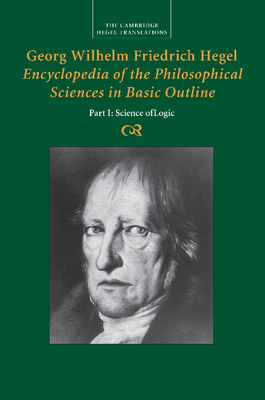
Georg Wilhelm Friedrich Hegel: Encyclopaedia of...
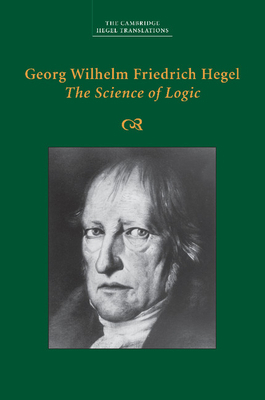
Georg Wilhelm Friedrich Hegel: The Science of L...

Science of Logic
Science of Logic , first published between 1812 and 1816, is the work in which Georg Wilhelm Friedrich Hegel outlined his vision of logic. Hegel's logic is a system of dialectics, i.e., a dialectical metaphysics: It is a development of the principle that thought and being constitute...
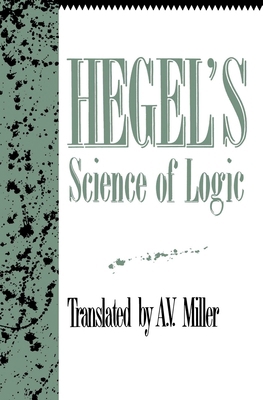
Hegel's Science of Logic
![Ciencia de la Logica (Spanish Edition) [Spanish] 1547195533 Book Cover](https://i.thriftbooks.com/api/imagehandler/l/372E75A562F7A5A87372B730958AD4108E9C657A.jpeg)
Ciencia de la Logica (Spanish Edition) [Spanish]

The Science of Logic
Hegel's "Logic" is one of the culminating breakthroughs of modern philosophy, containing the most thorough explanation of "dialectic" that Hegel ever wrote, and setting the stage for his "Philosophy of Nature" and "Philosophy of Mind." This translation by William Wallace, White's...
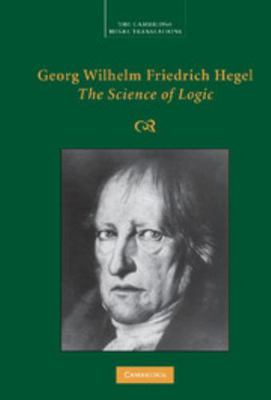
Georg Wilhelm Friedrich Hegel: The Science of L...
This new translation of The Science of Logic (also known as 'Greater Logic') includes the revised Book I (1832), Book II (1813), and Book III (1816). Recent research has given us a detailed picture of the process that led Hegel to his final conception of the System and of the...

Hegel's Science of Logic
Most of the major schools of contemporary philosophy, from Marxism to Existentialism, are reactions to Hegelianism and all, if they are to be understood, require some understanding of Hegel's Science of Logic.

Hegel's Science of Logic
Most of the major schools of contemporary philosophy, from Marxism to Existentialism, are reactions to Hegelianism and all, if they are to be understood, require some understanding of Hegel's Science of Logic.

Hegel's Science of Logic (Muirhead Library of P...
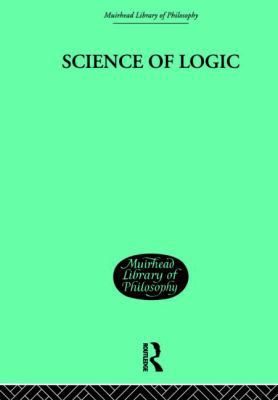
Science of Logic
First published in 2002. Routledge is an imprint of Taylor & Francis, an informa company.
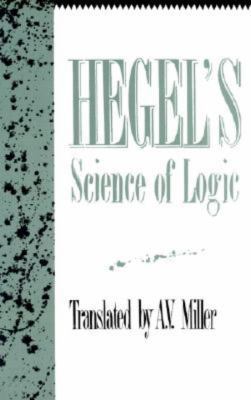
Hegel's Science of Logic
![Wissenschaft der Logik: Erster Teil: Die objekt... [German] 3843091722 Book Cover](https://m.media-amazon.com/images/I/41X4VCLDPuL._SL500_.jpg)
Wissenschaft der Logik: Erster Teil: Die objekt... [German]
Georg Wilhelm Friedrich Hegel: Wissenschaft der Logik. Erster Teil: Die objektive Logik Zweiter Teil: Die subjektive Logik Aufbauend auf seiner Ph nomenologie des Geistes entwickelt Hegel in den beiden 1812 und 1816 erschienen B nden eine ontologisch-metaphysische Logik und versucht,...

Hegel's Science of Logic
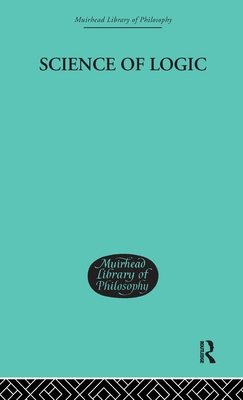
Science of Logic
![Wissenschaft der Logik. Zwieter Theil [German] 1018397647 Book Cover](https://i.thriftbooks.com/api/imagehandler/l/BBBCD3CCFB2401C7DB7AA5276F6528F295E6F0B3.jpeg)
Wissenschaft der Logik. Zwieter Theil [German]
This work has been selected by scholars as being culturally important, and is part of the knowledge base of civilization as we know it. This work is in the "public domain in the United States of America, and possibly other nations. Within the United States, you may freely...
![Georg Wilhelm Friedrich Hegel's Wissenschaft de... [German] 1019152478 Book Cover](https://i.thriftbooks.com/api/imagehandler/l/975E3D29831AE5E655AE3CFD0AA23D57A161E0C6.jpeg)
Georg Wilhelm Friedrich Hegel's Wissenschaft de... [German]
![Georg Wilhelm Friedrich Hegel's Wissenschaft de... [German] 1019147148 Book Cover](https://i.thriftbooks.com/api/imagehandler/l/FAA8D7467057520195F2B23FFCC533205E9FB504.jpeg)
Georg Wilhelm Friedrich Hegel's Wissenschaft de... [German]
![Science Of Logic [Spanish] 1547194847 Book Cover](https://i.thriftbooks.com/api/imagehandler/l/6C7A9554F0F733ED9592FE4E419564D113DDB155.jpeg)
Science Of Logic [Spanish]
In the Science of Logic, Hegel sets out to show that the process by which consciousness assimilates objects into mental concepts is more dynamic and, one might say, messier then Kant describes it. Just as he does in the Phenomenology, Hegel traces here the movement of consciousness,...
![Georg Wilhelm Friedrich Hegel's Wissenschaft de... [German] 0274178486 Book Cover](https://i.thriftbooks.com/api/imagehandler/l/E1003B4EACBD231DB6F6C6186A1DFFDDB68D6AF6.jpeg)
Georg Wilhelm Friedrich Hegel's Wissenschaft de... [German]
This work has been selected by scholars as being culturally important, and is part of the knowledge base of civilization as we know it. This work was reproduced from the original artifact, and remains as true to the original work as possible. Therefore, you will see the original...
![Hegels sämtliche Werke: Wissenschaft der Logik. [German] 0341433721 Book Cover](https://i.thriftbooks.com/api/imagehandler/l/5BA5EBE2EC2CCD2201298106CD1534E4EE00ECE3.jpeg)
Hegels sämtliche Werke: Wissenschaft der Logik. [German]
![Hegels sämtliche Werke: Wissenschaft der Logik. [German] 034143373X Book Cover](https://i.thriftbooks.com/api/imagehandler/l/5571EA5C3D325D27A729C7673A32EB71EA62B4AC.jpeg)
Hegels sämtliche Werke: Wissenschaft der Logik. [German]
![Georg Wilhelm Friedrich Hegel's Wissenschaft de... [German] 0274178478 Book Cover](https://i.thriftbooks.com/api/imagehandler/l/1AB105CB6ED0197EFA889BD5EB31D291A3CC786D.jpeg)
Georg Wilhelm Friedrich Hegel's Wissenschaft de... [German]
This work has been selected by scholars as being culturally important, and is part of the knowledge base of civilization as we know it. This work was reproduced from the original artifact, and remains as true to the original work as possible. Therefore, you will see the original...
![Science de la Logique-L'Être 1812 T. 1: L'Être ... [French] 284174387X Book Cover](https://m.media-amazon.com/images/I/51KGiuC80bL._SL500_.jpg)
Science de la Logique-L'Être 1812 T. 1: L'Être ... [French]
![Wissenschaft der Logik [German] 3752302410 Book Cover](https://i.thriftbooks.com/api/imagehandler/l/83C650B2CAC5FC075FA03D213C64F7731833DF38.jpeg)
Wissenschaft der Logik [German]
Reproduktion des Originals: Wissenschaft der Logik von Friedrich Georg Wilhelm Hegel



